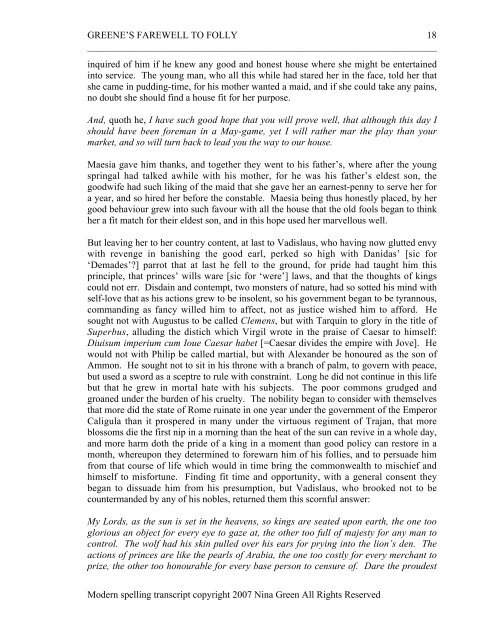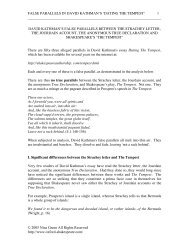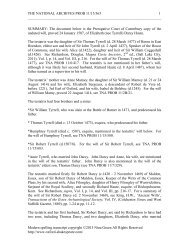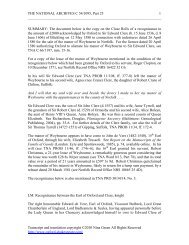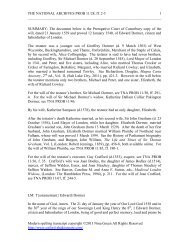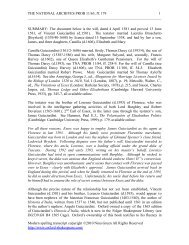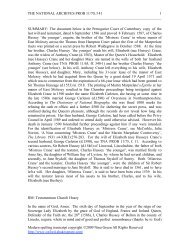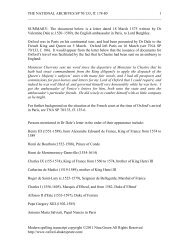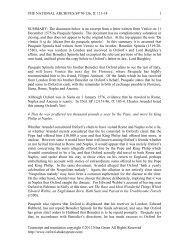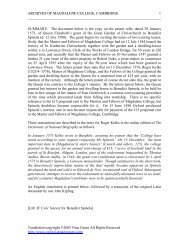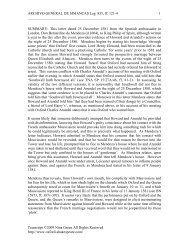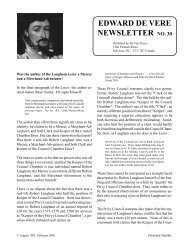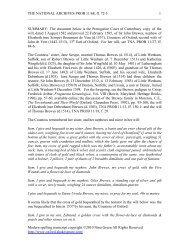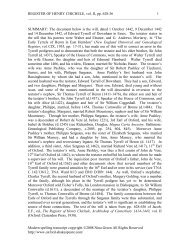GREENE'S FAREWELL TO FOLLY 1 Modern spelling tran
GREENE'S FAREWELL TO FOLLY 1 Modern spelling tran
GREENE'S FAREWELL TO FOLLY 1 Modern spelling tran
Create successful ePaper yourself
Turn your PDF publications into a flip-book with our unique Google optimized e-Paper software.
GREENE’S <strong>FAREWELL</strong> <strong>TO</strong> <strong>FOLLY</strong> 18<br />
________________________________________________________________________<br />
inquired of him if he knew any good and honest house where she might be entertained<br />
into service. The young man, who all this while had stared her in the face, told her that<br />
she came in pudding-time, for his mother wanted a maid, and if she could take any pains,<br />
no doubt she should find a house fit for her purpose.<br />
And, quoth he, I have such good hope that you will prove well, that although this day I<br />
should have been foreman in a May-game, yet I will rather mar the play than your<br />
market, and so will turn back to lead you the way to our house.<br />
Maesia gave him thanks, and together they went to his father’s, where after the young<br />
springal had talked awhile with his mother, for he was his father’s eldest son, the<br />
goodwife had such liking of the maid that she gave her an earnest-penny to serve her for<br />
a year, and so hired her before the constable. Maesia being thus honestly placed, by her<br />
good behaviour grew into such favour with all the house that the old fools began to think<br />
her a fit match for their eldest son, and in this hope used her marvellous well.<br />
But leaving her to her country content, at last to Vadislaus, who having now glutted envy<br />
with revenge in banishing the good earl, perked so high with Danidas’ [sic for<br />
‘Demades’?] parrot that at last he fell to the ground, for pride had taught him this<br />
principle, that princes’ wills ware [sic for ‘were’] laws, and that the thoughts of kings<br />
could not err. Disdain and contempt, two monsters of nature, had so sotted his mind with<br />
self-love that as his actions grew to be insolent, so his government began to be tyrannous,<br />
commanding as fancy willed him to affect, not as justice wished him to afford. He<br />
sought not with Augustus to be called Clemens, but with Tarquin to glory in the title of<br />
Superbus, alluding the distich which Virgil wrote in the praise of Caesar to himself:<br />
Diuisum imperium cum Ioue Caesar habet [=Caesar divides the empire with Jove]. He<br />
would not with Philip be called martial, but with Alexander be honoured as the son of<br />
Ammon. He sought not to sit in his throne with a branch of palm, to govern with peace,<br />
but used a sword as a sceptre to rule with constraint. Long he did not continue in this life<br />
but that he grew in mortal hate with his subjects. The poor commons grudged and<br />
groaned under the burden of his cruelty. The nobility began to consider with themselves<br />
that more did the state of Rome ruinate in one year under the government of the Emperor<br />
Caligula than it prospered in many under the virtuous regiment of Trajan, that more<br />
blossoms die the first nip in a morning than the heat of the sun can revive in a whole day,<br />
and more harm doth the pride of a king in a moment than good policy can restore in a<br />
month, whereupon they determined to forewarn him of his follies, and to persuade him<br />
from that course of life which would in time bring the commonwealth to mischief and<br />
himself to misfortune. Finding fit time and opportunity, with a general consent they<br />
began to dissuade him from his presumption, but Vadislaus, who brooked not to be<br />
countermanded by any of his nobles, returned them this scornful answer:<br />
My Lords, as the sun is set in the heavens, so kings are seated upon earth, the one too<br />
glorious an object for every eye to gaze at, the other too full of majesty for any man to<br />
control. The wolf had his skin pulled over his ears for prying into the lion’s den. The<br />
actions of princes are like the pearls of Arabia, the one too costly for every merchant to<br />
prize, the other too honourable for every base person to censure of. Dare the proudest<br />
<strong>Modern</strong> <strong>spelling</strong> <strong>tran</strong>script copyright 2007 Nina Green All Rights Reserved


